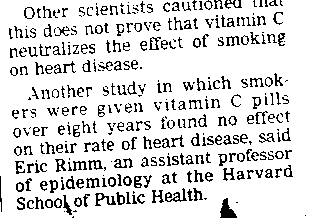

In plain English, vitamin C in the blood stream prevents heart disease! A major tenet of the Pauling/Rath Unified Theory of Heart Disease had been confirmed. All authorities agree that heart disease is caused by arterial lesions. When this German study was able to show that these lesions in smokers, a group at high risk, can reverse this precondition by increasing the level of vitamin C in the blood stream, it should have made national news! On the basis of this finding, what possible reason to postpone recommending Vitamin C supplementation immediately to everybody?
Of course, this didn't happen. It is instructive to consider how cleverly this major threat to the status quo was averted. First, the wording made it impossible for the ordinary lay person to understand the true meaning of the finding. Ditto the AP reporter.
Second, the obvious implication is that a doctor is required to
administer the vitamin C "injections." Clevely, a Harvard study was
cited as evidence vitamin C pills by themselves do not offer similar
protection.

As far as I can tell, a study that provided people with vitamin C pills did not occur at Harvard. This is a lie. (If I am wrong, I'd be happy to retract this statement.)
The Harvard finding of Professor Eric Rimm was news to me. So I wrote to the professor. No response. Then I wrote again. Still no response. I have since obtained the famous Harvard Vitamin E study, which I believe is the basis for this "balanced" report that vitamin C pills are not effective.
Almost unbelievably, this Harvard study, obstensibly of 39,910 individuals over 8 years, only considered the antioxidant intakes of 667 individuals who contracted CVD. 98.3% of the population's antioxidant intakes were not considered. Therefore, an "almost totally protective affect" of vitamin C on CVD would have been missed by Rimm, et. al, and this study should not have been used to refute the results of the AHA "injection" study.
Mission accomplished. The propoganda writers were effectively able to dodge a bullet. I hope they received the commendation they deserve from their benefactors. Bravo!!